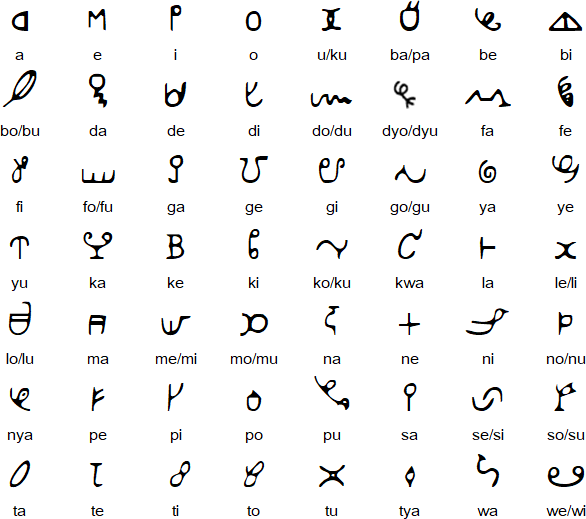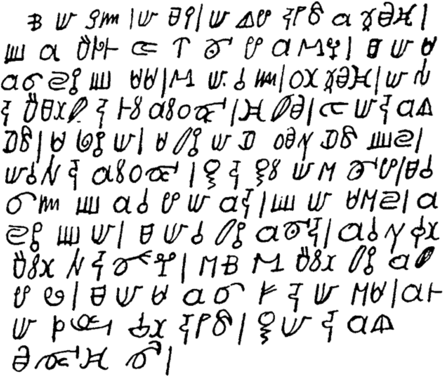In 1915 a Catholic missionary in Suriname called Brother Bernard saw a man, Afaka Atumisi's brother-in-law Abena, reading a book written in strange symbols. Abena was one of about 30 people who know the script at that time, and he told Brother Bernard about it. One of Brother Bernard's colleagues, Father Morssink, studied the script and tried to promote it, though without much success.
The Ndjuká syllabary does not represent all the sounds of the Ndjuká language, and as it became associated with European missionaries, the Ndjuká speakers, or Nende, saw the script as a relgious one unsuitable for everyday purposes. There was also no tradition of literacy among them. It is believed that this script is no longer used.
Notable features
- Type of writing system: syllabary
- Direction of writing: left to right in horizontal lines
- A vertical link is used as the equivalent of a full stop and comma.
- The glyphs of this syllabary are based on Latin and Arabic letters and numerals, and on traditional African graphic symbols.
Used to write
Ndjuká or Aukan, an English and Dutch-based creole spoken by about 25,000 people in Suriname and French Guiana. Other names for this language include Okanisi, Njuká, Ndyuka and Aukaans.Ndjuká Syllabary

Download a Ndjuká font (TrueType format, 22K).
Sample text in Ndjuká
This is apparently the first letter written by Afaka. It was copied into the Patili Molosi Buku in about 1917.
Transliteration
ke mi gadu | mi masa | mi bigi na ini a ulotu |fu a papila di yu be gi afaka | ma mi de
aga siki fu dede | fa mi sa du | oli ulotu | mi go
na pamalibo na lati ati oso | tu bolo | di mi ná abi
moni | de yaki mi | de taki mi mu oloko moni fosi |
mi sa go na ati osu | da na dati mi e begi | masa
gadu fu a sa gi mi ana | fu mi deesi | a
siki fu mi | ma mi sa taki abena | a sa kon tyali
patili go na ndyuka | eke fa patili taki a bun
gi wi | ma mi de aga pe na mi ede | ala
mi noso poli na ini ye | da mi ná abi
losutu ye |
Translation
Oh my God, my Lord, I start with the words on the paper that you've given Afaka. But I'm deathly ill. How can I say it? I went to Paramaribo, Lands Hospital, two times. Because I have no money, they chased me away. They say I must first earn money (before) I go to the Hospital. Therefore I pray the Lord God that he will give me a hand with the medicine for my illness. But I will talk to Abena. He will bring this to the Priest of the Ndyuka. So as the Father says it is good for us. But I have pain in my head. All my nose is rotting from the inside, I tell you. So I have no rest, I tell you.Source: http://en.wikipedia.org/wiki/Afaka_syllabary
Links
Information about the Ndjuká/Afaka syllabaryhttp://en.wikipedia.org/wiki/Afaka_syllabary
http://scriptsource.org/cms/scripts/page.php?item_id=script_detail&key=Afak
Information about the Aukan language
http://www.sil.org/americas/suriname/Aukan/Aukan.html
Online Aukan dictionaries
http://www.sil.org/americas/suriname/Aukan/English/AukanEngDictIndex.html http://www.sil.org/americas/suriname/Aukan/National/AukanNLDictIndex.html
No comments:
Post a Comment
Note: Only a member of this blog may post a comment.